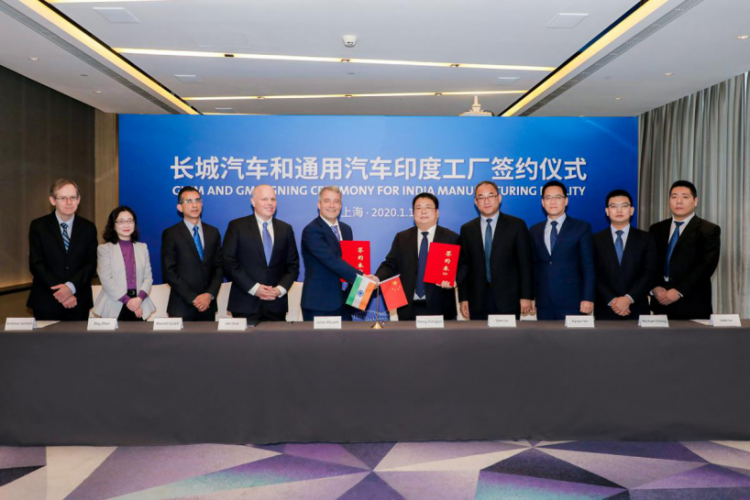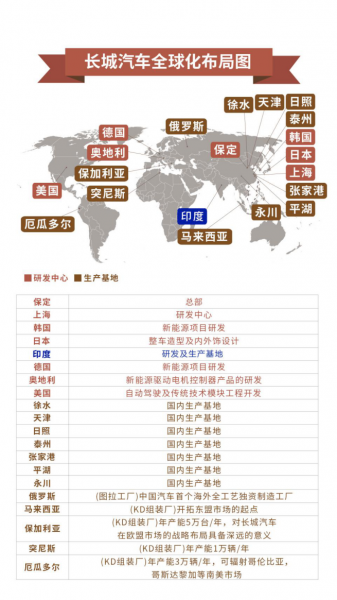On January 17, Great Wall Motors (GWM) and General Motors (GM) announced that they had reached an agreement on Great Wall Motors’ acquisition of GM’s Talegao plant in India. According to the investment letter of intent signed by the two parties, GM India, including the Tarigang plant, will be handed over to Great Wall Motors. The agreement is subject to government and regulatory approvals.

Great Wall Motors and General Motors India Plant Signing Ceremony
Liu Xiangshang, vice president of strategy of Great Wall Motors, said that the deal will lay an important foundation for Great Wall Motors to enter the Indian market. He said: “The Indian market has great potential, rapid economic growth, and a good investment environment. Entering the Indian market is an important layout of Great Wall Motors’ globalization strategy. India’s national strategy is an important measure to create a new India vision. The investment of Great Wall Motors will definitely create more direct or indirect jobs for the local area, further improve the labor skills of local employees, and stimulate the development of local supporting, R&D and related industries. Contribute greater profits and taxes to the Indian government and the state government of Maharashtra. Great Wall Motors will bring the Haval brand and Great Wall EV to the Delhi International Motor Show, and release the Indian market strategy to enter the Indian market.”
Julian Blissett, Senior Vice President of GM International Operations, said that the Talegaon manufacturing plant provides high-quality automotive products to the Indian and export markets, and expressed his gratitude to employees and partners for their excellent work over the years.
Blissett said: “Our decision to discontinue production in Talegaon is based on GM’s global strategy to optimize GM’s footprint around the world. On behalf of GM, I would like to express my sincere condolences to the Government of India and the State Government of Maharashtra. Thank you for the consistent support of General Motors since investing and manufacturing cars in India. General Motors will work closely with the state and national governments to ensure that the acquisition project is approved so that Great Wall Motors can make full use of the plant’s capacity and maintain Talegaon Motors. position in manufacturing.”
During the period, GM will provide generous exit benefits and transition support for its employees, as well as an orderly transition for its partners. The acquisition transaction reached by the two parties is expected to be completed in the second half of 2020.
Chevrolet will continue to fulfill all warranty and aftermarket support obligations, including ongoing service and parts needs for existing customers in India.
After the completion of the acquisition, the Tarigan factory in India will become Great Wall Motors’ second overseas and the tenth full-process vehicle factory in the world after the Tula factory in Russia. This factory will provide a strong guarantee for Great Wall Motors to enter the Indian market.

In 2019, Great Wall Motor’s sales exceeded 1.06 million vehicles, a year-on-year increase of 0.69%, and sales exceeded one million vehicles for four consecutive years. At the same time, Great Wall Motors has established a corporate development strategy that is fully committed to globalization. Up to now, Great Wall Motors has formed a global R&D pattern of “seven countries and ten places” and a global production layout of “9+5”, and has established more than 500 high-quality distribution networks in more than 60 countries around the world. Corner has become the common choice of more than 600,000 overseas consumers. In the Russian market, in 2019, the Haval brand jumped to the top of the sales of Chinese auto brands in Russia with a super-high growth rate of 289%.
In the future, Great Wall Motors will continue to focus on global development. The Indian market will become one of the most important components of Great Wall Motors’ strategic layout, providing strong support for the advanced development of Great Wall Motors’ globalization strategy.




